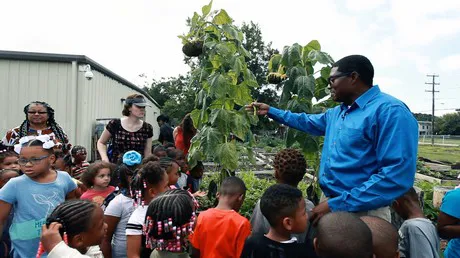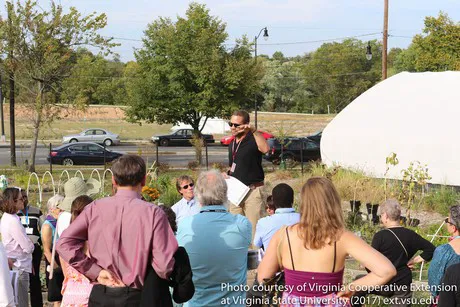Agriculture is increasingly spreading from rural areas into urban and suburban communities for many reasons, not the least of which includes a growth in the number of people who want their food sourced locally and a need for communities to eliminate food deserts. The United States Department of Agriculture defines a food desert as “…parts of the country vapid of fresh fruit, vegetables, and other healthful whole foods, usually found in impoverished areas.”
Evidence of urban agriculture’s rise in Virginia can be seen in counties like Arlington and Fairfax, which have already established legislation and zoning codes to address urban agriculture. Some communities like Alexandria, Fairfax and Arlington have long waiting lists for community garden spaces. Courses and training programs like Virginia State University’s 12-week Sustainable Urban Agriculture Certificate Program are growing in popularity. And the number of urban farms in Richmond, Hampton Roads and other urban areas across the commonwealth has exploded over recent years.

Curtis Moody teaches school children about planting and growing at Moody Street Garden. Photo courtesy of Cedric Owens.
As more farmers get started on vacant lots and rooftops and in shipping containers and other non-traditional urban spaces, conversations about research, policy, safety, land-usage rights and sustainability are on the rise.
To address these and other issues pertaining to the growth of Virginia’s urban agriculture industry, the Virginia Cooperative Extension program at Virginia State University, among other partners, is hosting the 4th Virginia Urban Agriculture Summit April 23–25, 2019, at the Founders Inn and Spa, 5641 Indian River Rd, Virginia Beach, Va. Over three days more than 100 urban farmers, gardeners, foodies, ag-tivists, policy makers and government leaders will convene to network and learn about one of agriculture’s fastest growing sectors.
“The Virginia Urban Agriculture Summit is an important learning opportunity for anyone seeking more knowledge to grow their own produce, either for personal consumption or for commercial sales,” said Dr. Leonard Githinji, Virginia State University Urban Agriculture Extension specialist. “People of all ages are becoming more focused on their health; they want to reconnect with the earth and learn how to grow vegetables and fruits. Urban agriculture offers a feasible option for these people and is an antidote to food deserts.”

Dr. Dwane Jones, director of the Center for Sustainable Development and Resilience, University of the District of Columbia, speaking to a group of attendees at the 2017 Virginia Urban Agriculture Summit
Keynote speakers include Dr. Jewel Bronaugh, Virginia’s 16th Commissioner of Agriculture; Duron Chavis, manager of Community Engagement at Lewis Ginter Botanical Garden in Richmond; Shelley Blades, farm manager and executive director of Lynchburg Grows; and Curtis Moody, community garden coordinator of Moody Street Garden of Newport News. Topics covered at the summit will include urban food systems, food deserts, food security, food safety, postharvest handling, food justice, urban environmental issues and urban economic development. Interested parties are encouraged to submit an abstract for an oral, poster or panel presentation for the summit. Visit https://www.ext.vsu.edu/vuas-abstracts before March 15.
Summit registration is $150 and is limited to 150 registrants. The registration cost includes two continental breakfasts, two buffet lunches, a networking dinner reception, and continuous food and drink refreshments throughout much of the summit. An award-winning chef will prepare food sourced from the freshest meats, seafood, as well as seasonal fruits and vegetables from local and regional artisan providers. To register, visit www.ext.vsu.edu/calendar, click on the event and then click on the registration link.
Accommodation is available for $99/night per room until midnight March 24. Visit https://www.ext.vsu.edu/vuas-conference-venue to book your accommodation or call the hotel at 1-844-382-7378. Registrants calling directly to book a room must ask for the “2019 Virginia Urban Agriculture Summit” room rate.
Watch an overview video from the 3rd Virginia Urban Agriculture Summit here:
Learn more about the first three summits at https://www.ext.vsu.edu/vuas-past-events.
For further information or if a person with a disability desires any assistive devices, services or other accommodations to participate in this activity, contact Mollie Klein at mklein@vsu.edu or call (804) 524-5964 / (800) 828-1120 (TDD) during business hours of 8 a.m. and 5 p.m. to discuss accommodations no later than five days prior to the event.
